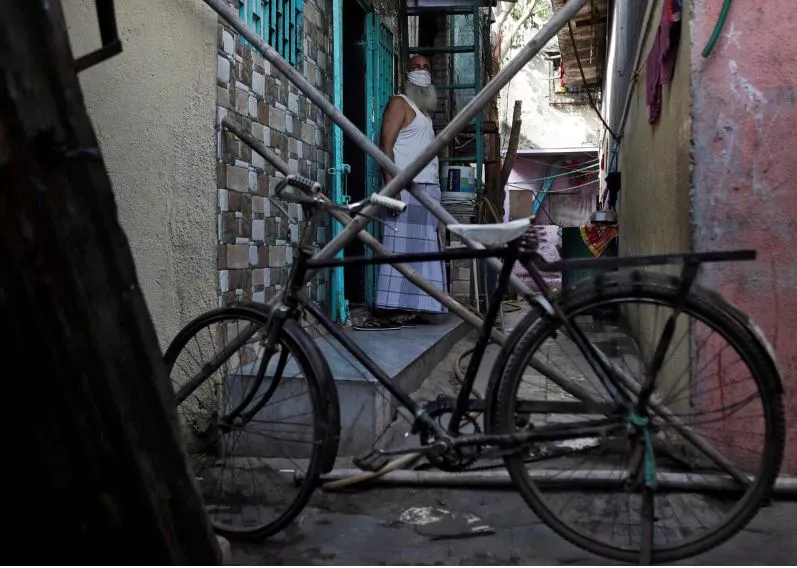Life under lockdown in India's massive Dharavi slum
Dharavi has 138 reported cases so far, but experts fear that number will accelerate higher
MUMBAI: In homes that are cramped, stuffy and increasingly low on food, residents of Mumbai’s huge Dharavi slum are struggling under India’s nationwide lockdown.In Dharavi, where an estimated one million people live, residents are stretching out meals and relying on donations. But anxiety has been building since the lockdown began on March 25.
“I used to feed my children when I went out for work, but now there is only sorrow and no work,” said Najma Mohammad, who was employed at a garment shop that has closed. Her son and two daughters rely on food handouts from neighbours, she added.
OIC slams India’s vicious Islamophobic campaign
Dharavi, believed to be Asia’s largest slum, is a tough place to be confined, and also one of the most vulnerable to the new coronavirus because of the density of its population and poor sanitation.
Hundreds of people sometimes share the same bathroom. Access to clean water is not guaranteed. Soap has become a luxury.
“Anything can happen. There are nine people in this room, all of us could be in danger,” said migrant worker Namchand Mandal, who is from the northeastern state of Jharkhand.
Dharavi has 138 reported cases so far, but experts fear that number will accelerate higher.
“I am really worried it is just a matter of time,” virologist Shahid Jameel said of Mumbai’s slums, which are home to an estimated 65% of the city’s core population of around 12 million.
Anxious residents have tied handkerchiefs or shirt sleeves around their faces in lieu of proper masks. Some have also barricaded alleyways using carts, bicycles and sticks. Signs warn outsiders to keep away.
Still, many residents say it is impossible to stay confined in small rooms, which are sometimes shared by day labourers who work different shifts.
Deep in the slums, people throng informal markets. Some adults kill time playing chess or watching videos on their cell phones. Children play cricket and cards.
One tailor opened his small shop early in the morning, saying he wanted to make a little money before police arrived later in the day to enforce the lockdown.
In Dharavi, where an estimated one million people live, residents are stretching out meals and relying on donations. But anxiety has been building since the lockdown began on March 25.
“I used to feed my children when I went out for work, but now there is only sorrow and no work,” said Najma Mohammad, who was employed at a garment shop that has closed. Her son and two daughters rely on food handouts from neighbours, she added.
Dharavi, believed to be Asia’s largest slum, is a tough place to be confined, and also one of the most vulnerable to the new coronavirus because of the density of its population and poor sanitation.
Hundreds of people sometimes share the same bathroom. Access to clean water is not guaranteed. Soap has become a luxury.
“Anything can happen. There are nine people in this room, all of us could be in danger,” said migrant worker Namchand Mandal, who is from the northeastern state of Jharkhand.
Dharavi has 138 reported cases so far, but experts fear that number will accelerate higher.
“I am really worried it is just a matter of time,” virologist Shahid Jameel said of Mumbai’s slums, which are home to an estimated 65% of the city’s core population of around 12 million.
Anxious residents have tied handkerchiefs or shirt sleeves around their faces in lieu of proper masks. Some have also barricaded alleyways using carts, bicycles and sticks. Signs warn outsiders to keep away.
Sindh govt finalises SOPs for businesses to continue operations during lockdown
Still, many residents say it is impossible to stay confined in small rooms, which are sometimes shared by day labourers who work different shifts.
Deep in the slums, people throng informal markets. Some adults kill time playing chess or watching videos on their cell phones. Children play cricket and cards.
One tailor opened his small shop early in the morning, saying he wanted to make a little money before police arrived later in the day to enforce the lockdown.


COMMENTS
Comments are moderated and generally will be posted if they are on-topic and not abusive.
For more information, please see our Comments FAQ